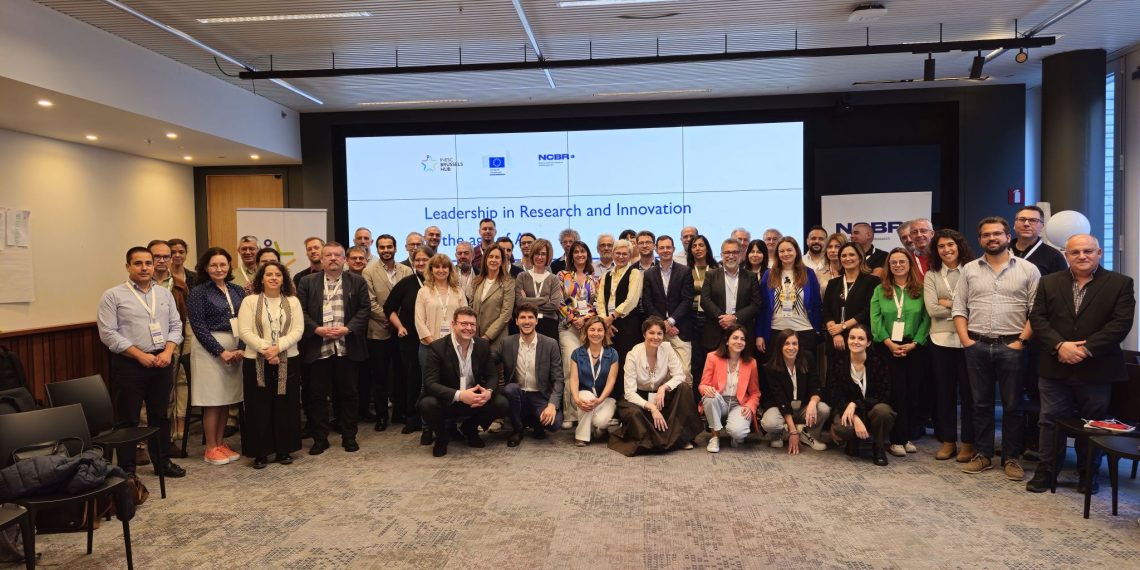The motto “What is the future of R&D leadership in the era of Artificial Intelligence?” brought together more than 60 people. From administrators to managers, researchers and even policymakers: the discussion took place in Brussels, during an initiative organised by the INESC Brussels Hub, in liaison with the European Commission and the NCBR Office in Brussels.
In the very near future, Artificial Intelligence (AI) will reconfigure R&D leadership; therefore, it is vital to discuss how the integration of AI should be done, in line with research and development practices. But this discussion cannot take place without the participation of European leaders. In this sense, Signe Ratso, Deputy Director-General of the Directorate-General Research and Innovation of the European Commission (EC), joined this event, showing key-results – namely, the fact that 60% of current AI publications explore applications in science – and stressing that the EU must reduce the gap that currently separates it from China and the U.S.A., as far as AI is concerned.
In the name of a meaningful discussion, it’s important to gather the outlook from three players: policymakers, industry professionals, and researchers. In this sense, Liviu Stirbat, Head of Unit for AI in Science in the DG for Research and Innovation at the European Commission, also attended the event, presenting the evolution of AI within the European Union, and highlighting the path taken in ensuring a responsible and safe use of AI in science. In March 2024, for example, the European Commission published a series of guidelines to support the European research community in the responsible use of generative AI (here). In addition, Liviu Stribat also reinforced the importance of open science initiatives, like the European Open Science Cloud (EOSC) for the development of AI.
The industry insight was provided by Google‘s Ondrej Socuvka, who explained that the company’s scientists have been exploring the limits of Artificial Intelligence boldly and responsibly, driven by a collective effort of the scientific community. This collaborative approach not only promotes innovation, but also ensures that the development of AI complies with the highest standards of safety and accountability. Ricardo Miguéis, Head of Office of INESC Brussels Hub, focused on science, stating that to improve AI’s strategic importance in European competitiveness, it is crucial to perceive it as one of the main drivers of innovation, with economic impact and societal benefits.
But the reality is that the discussion is still ongoing, with many questions that need to be asked, namely: what are the main challenges when integrating AI with leadership management practices in R&D?; how are managers perceiving the role of AI in changing what could be the leadership in R&D?; and what is, in fact, the role that policy-makers should play in facilitating the integration of AI into R&D? Dirk Stockmans and Oliver Kozak, who served as facilitators of these discussions, presented the questions so that everyone could reflect, discuss and outline practical strategies that help leaders to overcome obstacles and face the challenges that lie ahead – especially considering the pace of evolution that this technology has been experiencing.
The die was cast, with the discussion of many ideas. On behalf of INESC TEC, we highlight the speeches of João Claro, Chairman of the Board of Directors, Lia Patrício, member of the Board, and Ana Nunes Alonso, researcher. João Claro and Ana Nunes Alonso were, in fact, responsible for promoting two of the eight working groups to discuss the main trends, challenges and opportunities of AI in R&D leadership.
In the group led by INESC TEC researcher Ana Nunes Alonso, the discussion focused on the urgent need to promote AI literacy to educate both the younger generations – who already deal with AI in their daily lives even if they do not have this notion -, and managers and scientists – who can, for example, integrate and use AI tools in their activities. Following this line of thought, Lia Patrício focused on the importance of concepts like citizen engagement, so that the various stakeholders of society are called upon to actively participate in the discussion.
The results of this event, which represented another of the various actions that INESC TEC has been promoting in terms of public policies, will now be discussed with the European Commission, to further exploit them.
The researchers mentioned in this news piece are associated with INESC TEC, UP-FEUP and U. Minho.


 News, current topics, curiosities and so much more about INESC TEC and its community!
News, current topics, curiosities and so much more about INESC TEC and its community!